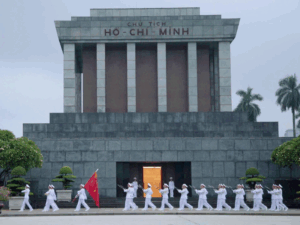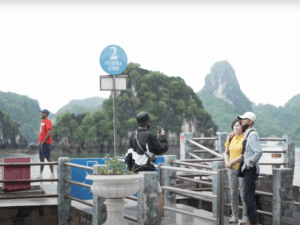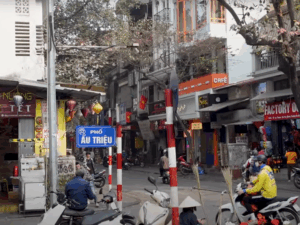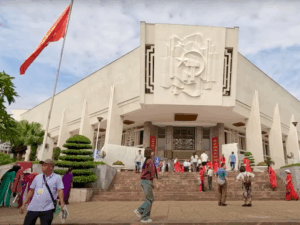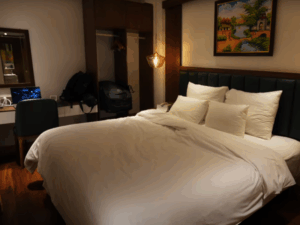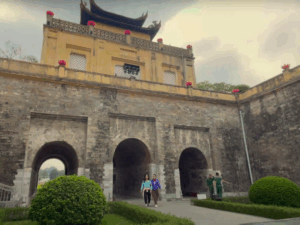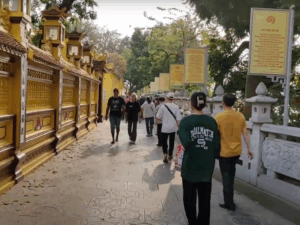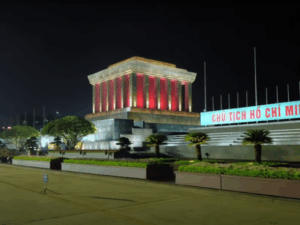Bridges are not just structures that connect two points, they are symbols of connection and unity. The Long Bien Bridge is one such structure that embodies the spirit of connection, resilience, and hope. Located in Hanoi, Vietnam, this iconic bridge has stood the test of time, surviving wars and natural calamities, and continues to connect people different walks of life. In this blog post, we will explore the inspirational story of the Long Bien Bridge.
Introduction to the Long Bien Bridge in Hanoi
Welcome, fellow travelers and history buffs! Imagine a bridge that has witnessed the ebbs and flows of history, stood tall through wars, and now serves as a beautiful symbol of Vietnam’s resilience. That’s Long Bien Bridge for you—one of Hanoi’s most captivating landmarks. This blog post will take you on a fascinating journey through the history, architecture, and modern-day significance of this incredible structure. Whether you’re an architecture enthusiast, a history geek, or someone just looking for the next great travel spot, there’s something here for you.
Historical Perspective
A French Colonial Legacy
Constructed between 1899 and 1902, Long Bien Bridge was designed by the renowned Gustave Eiffel (yes, the same genius behind the Eiffel Tower). Built during the French colonial period, it’s one of the oldest bridges in Vietnam. Originally named Paul Doumer Bridge after the Governor-General of French Indochina, it symbolized French engineering prowess and colonial ambition.
The Bridge During the Vietnam War
Long Bien Bridge has a storied past, especially during the Vietnam War. Severely bombed by the U.S. forces due to its strategic importance, the bridge was a lifeline for transporting goods and troops. Despite being hit repeatedly, the spirit of the Vietnamese people shone through as they continually repaired and maintained it, making it a symbol of resilience and national pride.
Rebuilding and Preservation
After the war, extensive renovation efforts brought the bridge back to life. Preserving its historical value while ensuring safety for modern use has been a delicate balance. Today, Long Bien Bridge stands as a testament to Vietnam’s enduring spirit and historical legacy.
Architectural Marvel
Engineering Excellence
Long Bien Bridge is a cantilever bridge, stretching 1.68 kilometers across the Red River. Its design features a combination of steel trusses and lattice girders, showcasing early 20th-century engineering brilliance. The bridge’s unique architecture makes it a valuable case study for engineering students and professionals alike.
Aesthetic Appeal
The bridge’s rusty hues and intricate details create a picturesque scene, especially at dawn and dusk. Its design not only serves a functional purpose but also offers aesthetic pleasure. Photographers and artists often find themselves drawn to its timeless beauty.
Structural Features
One of the most striking features is its asymmetrical structure, with parts dedicated to rail traffic, pedestrians, and bicycles. This design reflects a blend of functionality and foresight, accommodating various modes of transport long before multi-modal travel became a buzzword.
The Bridge in Modern Times
A Vital Part of Hanoi’s Infrastructure
Today, Long Bien Bridge continues to be a vital artery for Hanoi. While its role in heavy transport has diminished, it still serves as an important route for pedestrians, cyclists, and light vehicles. Its strategic location connects Hanoi’s bustling Old Quarter with the less chaotic Long Bien District.
A Tourist Attraction
The bridge has evolved into one of Hanoi’s most popular tourist attractions. It offers a unique vantage point to take in the city’s vibrant life and the serene Red River. Guided tours frequently include a walk or bike ride across the bridge, allowing tourists to soak in its historical ambiance.
Preservation Efforts
Maintaining the bridge is an ongoing effort. Local authorities and international organizations have collaborated to ensure its preservation. Regular maintenance work aims to retain its historical charm while adapting to modern safety standards.
Personal Experiences
Traveler Testimonials
Many travelers have shared their emotional experiences of visiting Long Bien Bridge. Julia from Germany described it as “walking through a living history book, where every step narrates a story of resilience and beauty.”
Local Stories
Locals often recount tales of their ancestors who lived through the war and the bridge’s subsequent rebuilds. Mr. Thanh, a local vendor, mentioned, “This bridge is more than a structure; it’s a part of our lives. It’s where we sell our goods, watch sunsets, and tell stories.”
A Photographer’s Dream
For photography enthusiasts, the bridge offers endless opportunities. The interplay of light and shadow, the rustic texture of the steel, and the backdrop of the Red River make for breathtaking shots. If you’re lucky, you might even capture the nostalgic charm of a passing train.
Tips for Visitors
Best Times to Visit
The best times to visit Long Bien Bridge are early morning and late afternoon. These times offer the best lighting for photography and a chance to experience the bridge without the hustle and bustle of the day.
How to Get There
Long Bien Bridge is easily accessible from Hanoi’s Old Quarter. You can either walk, bike, or take a short taxi ride. If you prefer public transport, several bus routes pass near the bridge.
Nearby Attractions
Combine your visit with other nearby attractions like the bustling Dong Xuan Market or the tranquil Long Bien Tea House. Both spots offer a rich slice of Hanoi’s culture and history, making your trip even more memorable.
Conclusion
Long Bien Bridge is more than just a means of crossing the Red River. It’s a symbol of Hanoi’s historical richness, architectural marvel, and community spirit. Whether you’re a history buff, an architecture lover, or a travel enthusiast, this bridge offers something uniquely captivating. Ready to explore more of Vietnam’s historical gems? Discover the stories and sites that make this country a fascinating destination.
- Uncover Cambodia’s Hidden Charms 6 Days / 5 Nights (173 views)
- The Best Exotic Vietnam – 16 Days / 15 Nights (116 views)
- The 10 Best Tour Operators in Vietnam for 2025: An Expert, Objective Review (90 views)
- Discover the Enchanting Culture of Hanoi in Every Sense (80 views)
- Seamless Cruise: Halong Bay to Da Nang – Fostering smooth travel experience from Halong Bay to Da Nang. (76 views)

